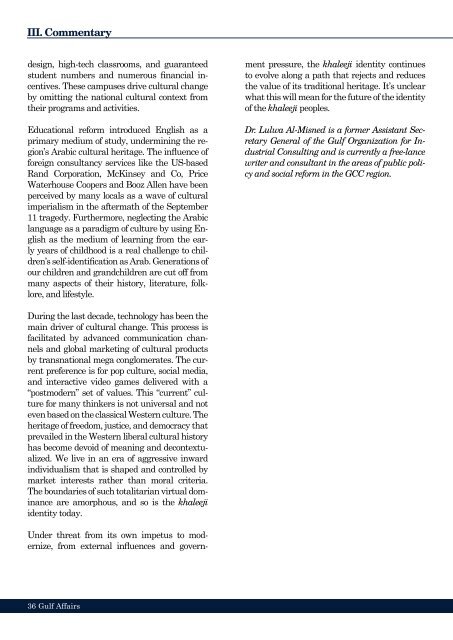Create successful ePaper yourself
Turn your PDF publications into a flip-book with our unique Google optimized e-Paper software.
III. Commentary<br />
design, high-tech classrooms, and guaranteed<br />
student numbers and numerous financial incentives.<br />
These campuses drive cultural change<br />
by omitting the national cultural context from<br />
their programs and activities.<br />
Educational reform introduced English as a<br />
primary medium of study, undermining the region’s<br />
Arabic cultural heritage. The influence of<br />
foreign consultancy services like the US-based<br />
Rand Corporation, McKinsey and Co, Price<br />
Waterhouse Coopers and Booz Allen have been<br />
perceived by many locals as a wave of cultural<br />
imperialism in the aftermath of the September<br />
11 tragedy. Furthermore, neglecting the Arabic<br />
language as a paradigm of culture by using English<br />
as the medium of learning from the early<br />
years of childhood is a real challenge to children’s<br />
self-identification as Arab. Generations of<br />
our children and grandchildren are cut off from<br />
many aspects of their history, literature, folklore,<br />
and lifestyle.<br />
Under threat from its own impetus to modernize,<br />
from external influences and government<br />
pressure, the khaleeji identity continues<br />
to evolve along a path that rejects and reduces<br />
the value of its traditional heritage. It’s unclear<br />
what this will mean for the future of the identity<br />
of the khaleeji peoples.<br />
Dr. Lulwa Al-Misned is a former Assistant Secretary<br />
General of the Gulf Organization for Industrial<br />
Consulting and is currently a free-lance<br />
writer and consultant in the areas of public policy<br />
and social reform in the GCC region.<br />
During the last decade, technology has been the<br />
main driver of cultural change. This process is<br />
facilitated by advanced communication channels<br />
and global marketing of cultural products<br />
by transnational mega conglomerates. The current<br />
preference is for pop culture, social media,<br />
and interactive video games delivered with a<br />
“postmodern” set of values. This “current” culture<br />
for many thinkers is not universal and not<br />
even based on the classical Western culture. The<br />
heritage of freedom, justice, and democracy that<br />
prevailed in the Western liberal cultural history<br />
has become devoid of meaning and decontextualized.<br />
We live in an era of aggressive inward<br />
individualism that is shaped and controlled by<br />
market interests rather than moral criteria.<br />
The boundaries of such totalitarian virtual dominance<br />
are amorphous, and so is the khaleeji<br />
identity today.<br />
36 Gulf Affairs


